The Perfect American Success Story

Unfortunately it appears the apocalypse is going to look very cool on camera for a little while before it really kicks in.
Today the great Vince Mancini joins us to write about Flamin' Hot the latest Business Mindset biopic about the guy who invented (or didn't!!?) a different kind of Cheeto.
Previously Vince and I had a great discussion about the film The Menu here.

The other day I wrote about the film The Platform if you missed it. This is a film blog now I guess.
Both of those are paywalled but I have one free year's subscription to give away thanks to Jason in Washington. Better reply quick if you want it.
I also have a handful of autographed copies of ACWF left to send out. Here's the deal: $65 for a full year of Hell World plus the book. Not bad!
I am sad to report that the woke mob (death) has finally come for Pat Robertson. I only say I'm sad because it's a shame he got to live that long. I wonder if he died mad thinking about rainbow t-shirts at Target or whatever? Spencer Ackerman had a good one at Forever Wars yesterday on his shameful legacy.
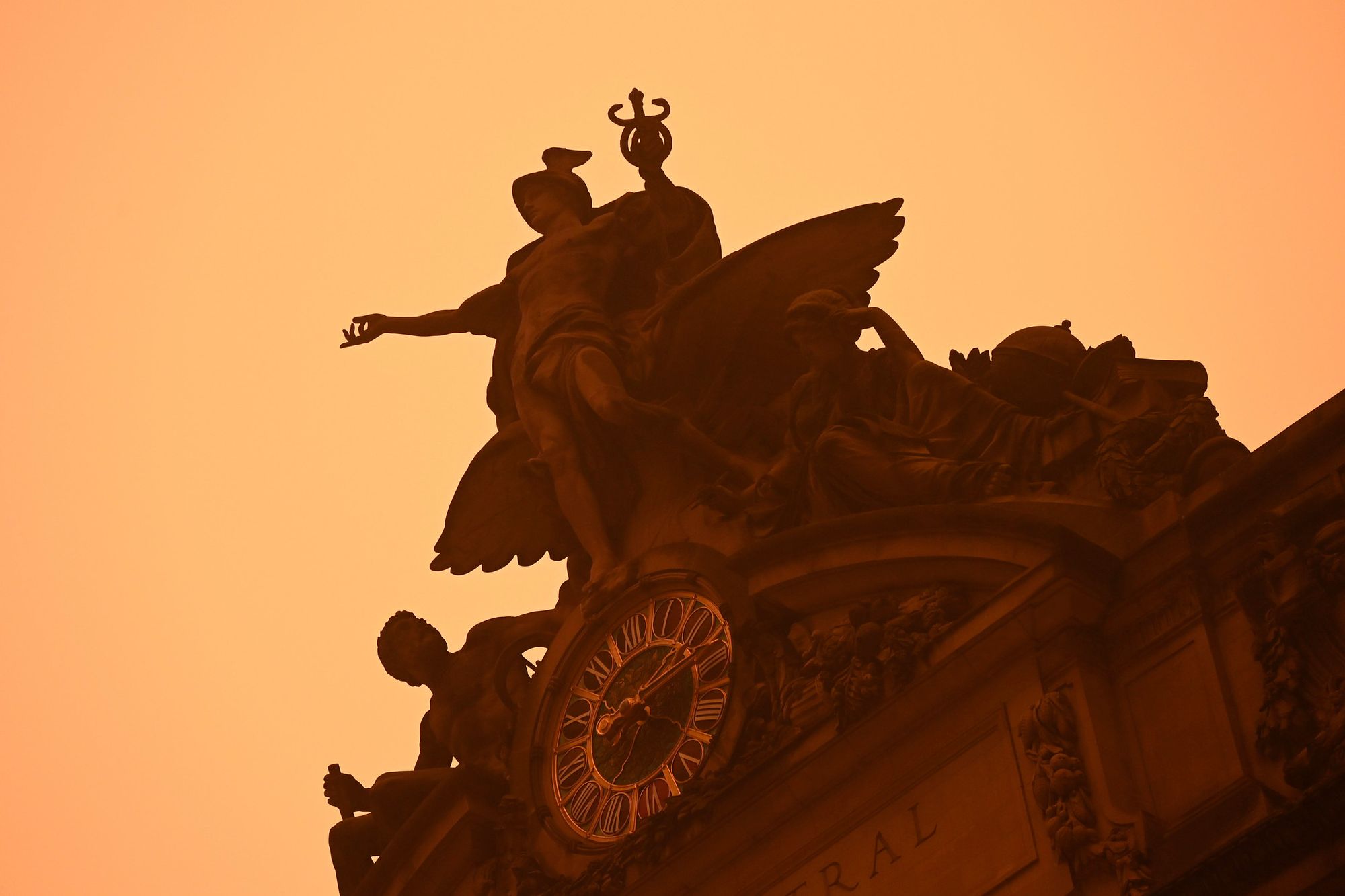
It never got as smoky here in Massachusetts as it got elsewhere this week but it was bad enough for a couple days that you had to contend with it. To never not be aware of it. Even as a smoker (sorry) me going well this fucking sucks all day. I can't breathe right and everything smells like shit. Just because you're used to inhaling one type of smoke doesn't make you less susceptible to a second unrelated kind. How you might share a common language with someone but their dialect is unintelligible to you when they're speaking.
It smelled like a peaty whisky in the air which surprisingly pairs very poorly with drinking an actual peaty whisky. You might think the flavor profiles would mingle well but you would be wrong.
Inside the hospital the air was much cleaner. Well not entirely clean I'm sure I was probably inhaling big batches of Covid but at least it wasn't the smoke for the time being. On my phone people were engaging in a sort of suffering one upmanship. Arguing over who had the right to complain. Whether or not the media and our elected leaders would all come together to take climate change seriously now that it was impacting a real place like the east coast and not just the idea of one like the west coast. (They will not.)
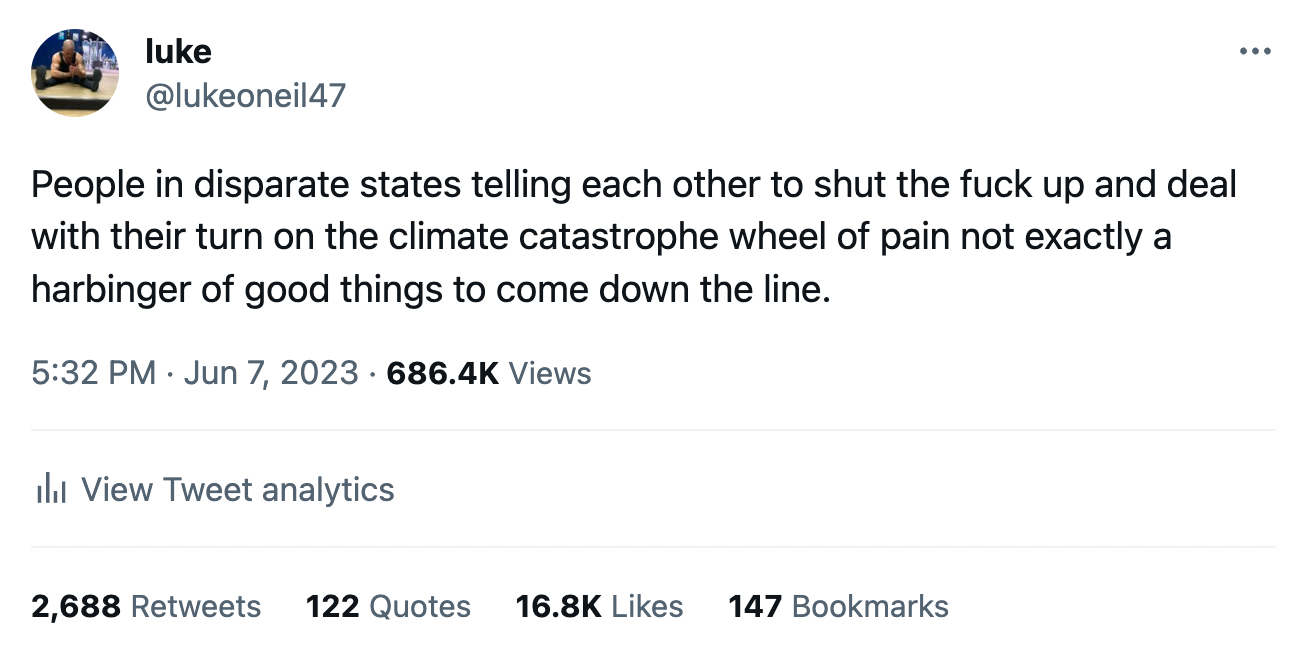
I wrote about my relationship to California in here a while back (this one is also for paid subscribers)

Everything I try to remember about being in California feels like it happened on some show I watch to fall asleep to. Not because most of them are filmed there but more so that I don’t remember the plot or the dialogue of my own experiences and it’s all operating there in my subconscious in the background fucking me up from the past even when I’m not paying attention.
Don’t misunderstand me I love it there I want to be there right now although I just saw it’s 110 degrees today so maybe scrap this whole idea.
Also there are the fires and the droughts to consider.
Nonetheless I am pulled there in a type of longing specific to me but also with the same cliche longing we all have in common for the west the way that has pulled people there forever with all the songs and movies and all that. How if the continent were a table and you turned it on its side and gravity came into play and we all tumbled westward. I’m pulled both by the idea of freedom and the expanse the land itself represents in the American mythology but also the lie of the myth. I want to experience the lie. The make believe of it that people know is make believe but let themselves operate inside of anyway.
Being lied to isn’t so bad sometimes compared to being aware of how things actually are. You wouldn’t want to go around like that for very long.
And then on my phone while I sat there in the little waiting room there were a bunch of people floating over the fray going people aren't actually fighting over this type of thing in real life. Twitter isn't real life they said and always say and I never really know what they actually mean when they say that type of shit.
I've written about wildfires on the west coast too many times over the years to include them all but I just thought of this chunk from the Welcome to Hell World book which I figured I'd share mostly because of how it ends.
I watched a video just now of a person driving through the wreckage of fires that ravaged northern California and it showed dozens of abandoned and destroyed cars and a tractor trailer left in the middle of the road and a burned out school bus. That town in particular was called Paradise, California, which is . . . a lot in terms of what the name of a place might be. It doesn’t look much different than what the end of the world looks like when you think about what the end of the world might look like. For a lot of people it actually was the end of the world because around a hundred people died in the fires there and elsewhere in California around the same time. Four people were found dead in their cars in Paradise and one was found just outside of their car and I don’t want to think about what it is like to die like that.
At a beach in Southern California where another fire was going on people gathered with their horses and other animals to wait out the fire at a safe distance because they didn’t know what else to do and one thing people and animals have in common is that they know to run away from fire.
Not too far from that fire a guy whose name I already forget murdered a dozen people inside of a bar where they were listening to country music and having a nice time. It was reported by NBC News that he posted to social media before and during the attack speculating about how people would try to ascertain his mental state and they reported he said that he wasn’t insane just bored which is why he had gone and killed everyone.
Something else CNN reported he posted is this: “I hope people call me insane,” and then some laughing emojis. “Wouldn’t that just be a big ball of irony? Yeah.. I’m insane, but the only thing you people do after these shootings is ‘hopes and prayers’. . . or ‘keep you in my thoughts’. . . every time . . . and wonder why these keep happening . . .” and that is chilling to read but he’s also not wrong about the last part is he?
I don’t really know what hell is but I don’t think it’s a place where bad things happen to people randomly such as natural disasters and death because that’s just what the regular world is. I think it’s probably more accurate to say it’s a place where bad things happen because someone wanted them to happen to you or just let them happen out of negligence and indifference. Where bad things happen and they didn’t have to but your life was less important to someone else than what they thought they had to gain.
There are a bunch of stories about fires and climate change in the new book too naturally. Not naturally. You know what I mean.
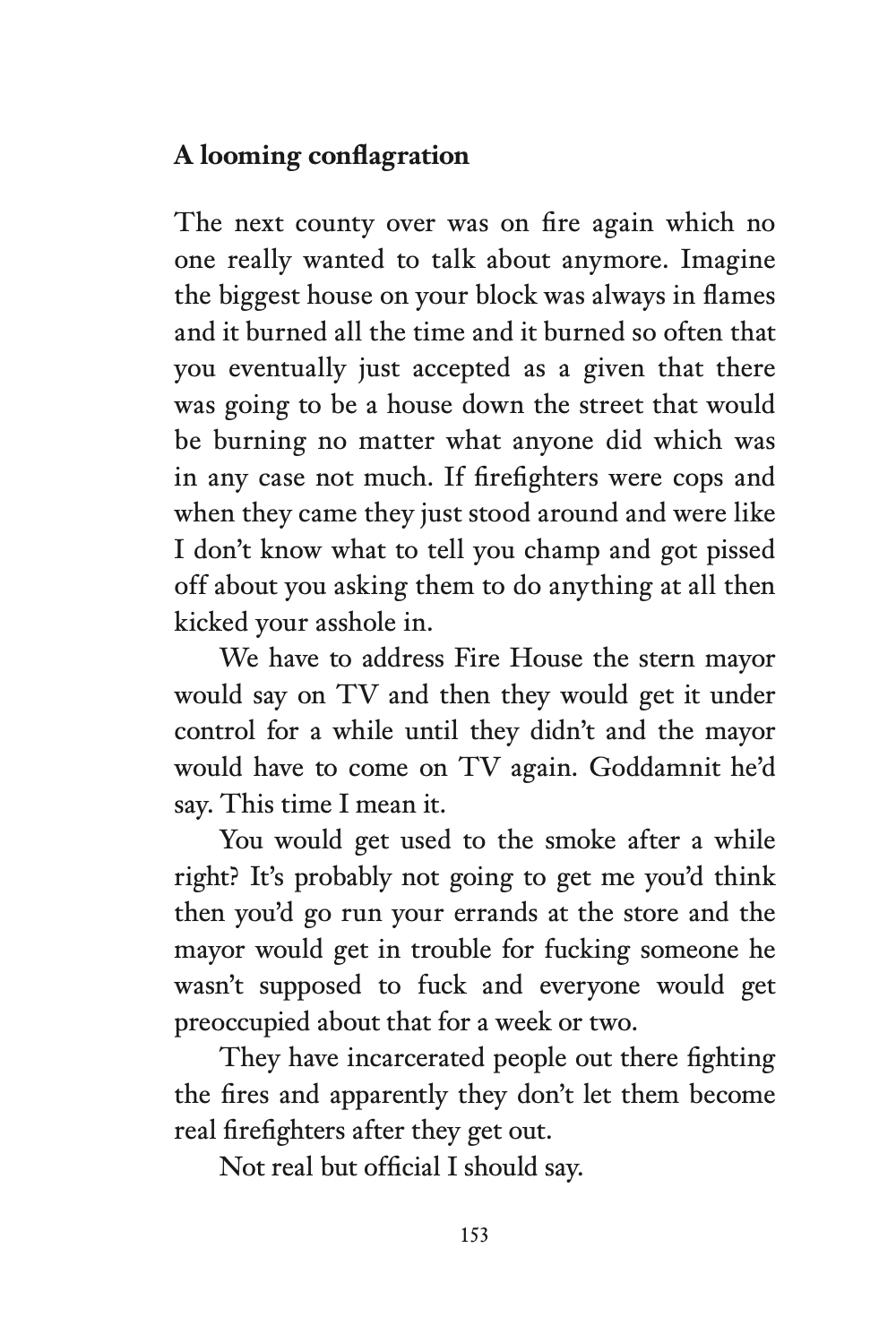
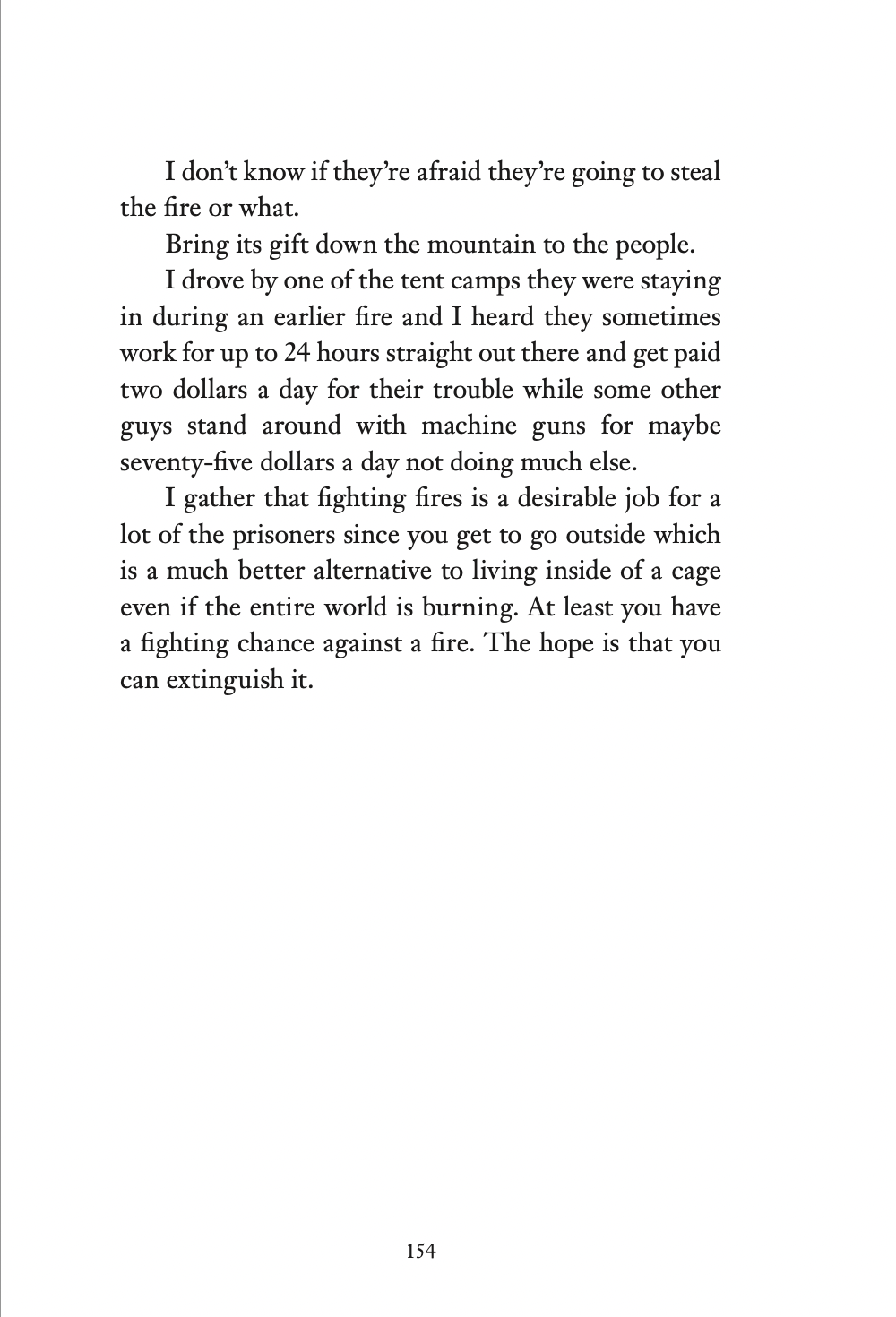
And this one that starts like so:
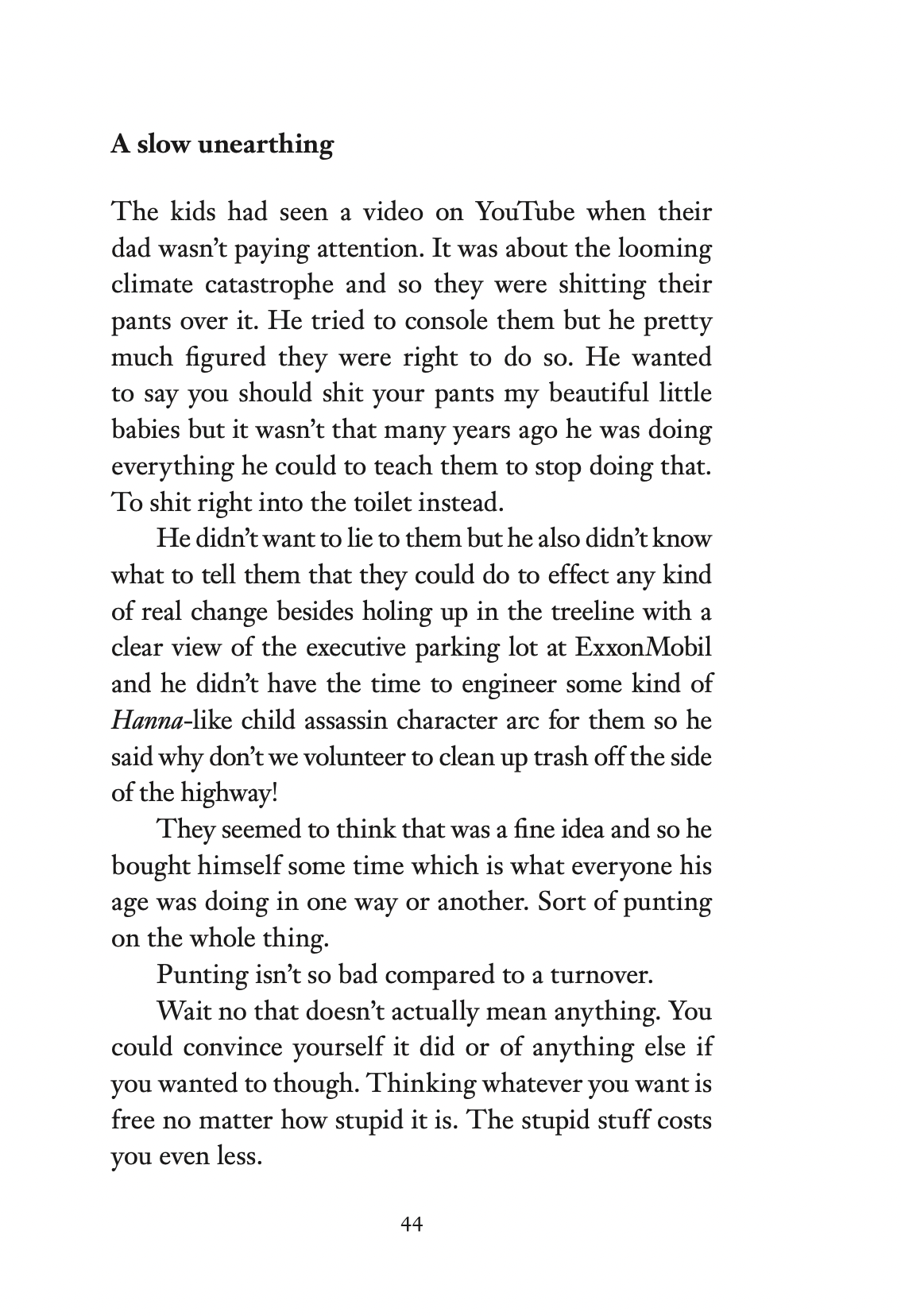
That reminds me you should come to this in New York on July 7 provided New York still exists by then. RSVP here (for free) please so we know how many are coming. Look at this crew. What a crop!
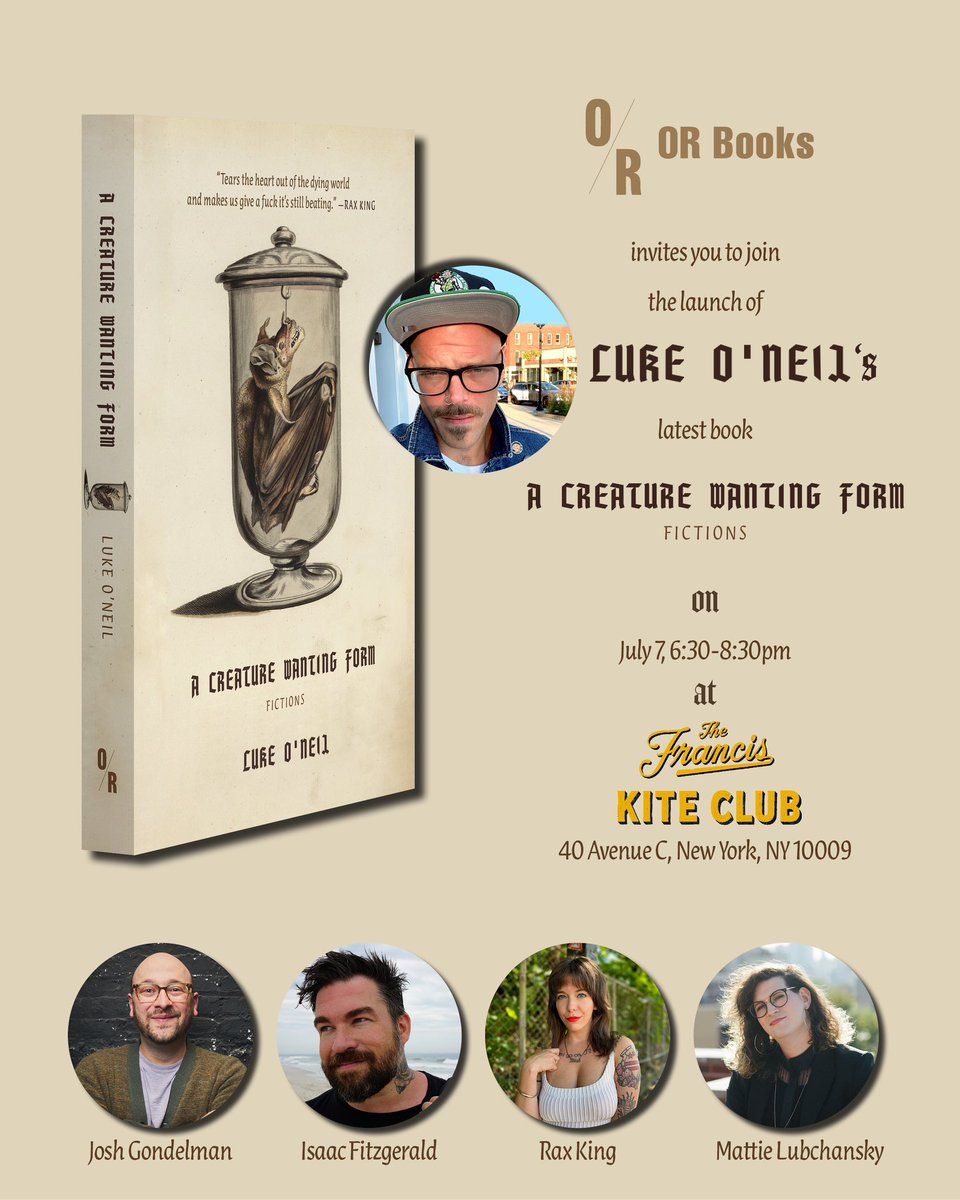
Thanks again to everyone who has bought book. Keep sending me those pictures I love to see it. (Fills me with pride for approximately 30 seconds each time before I default back to miserable.)
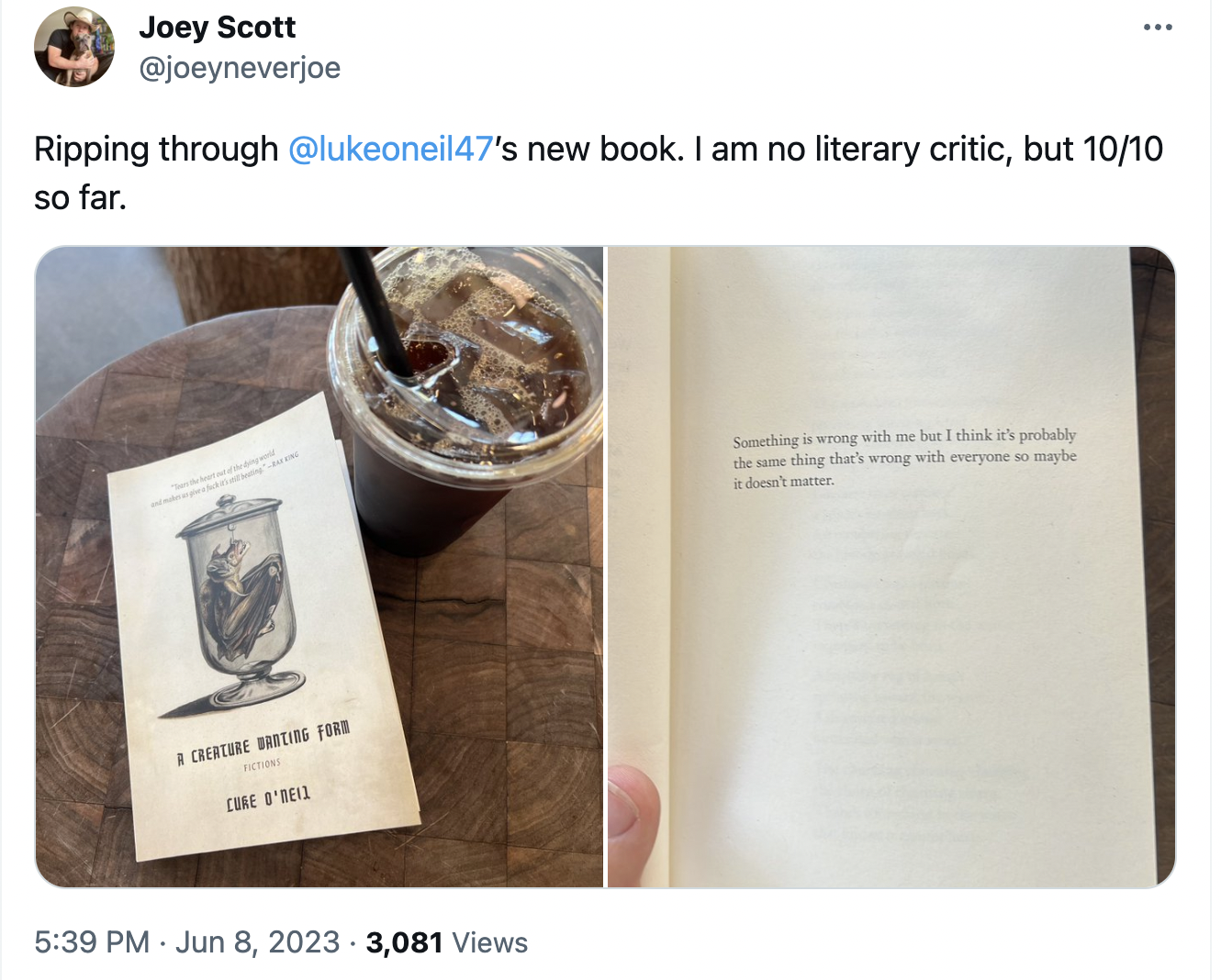
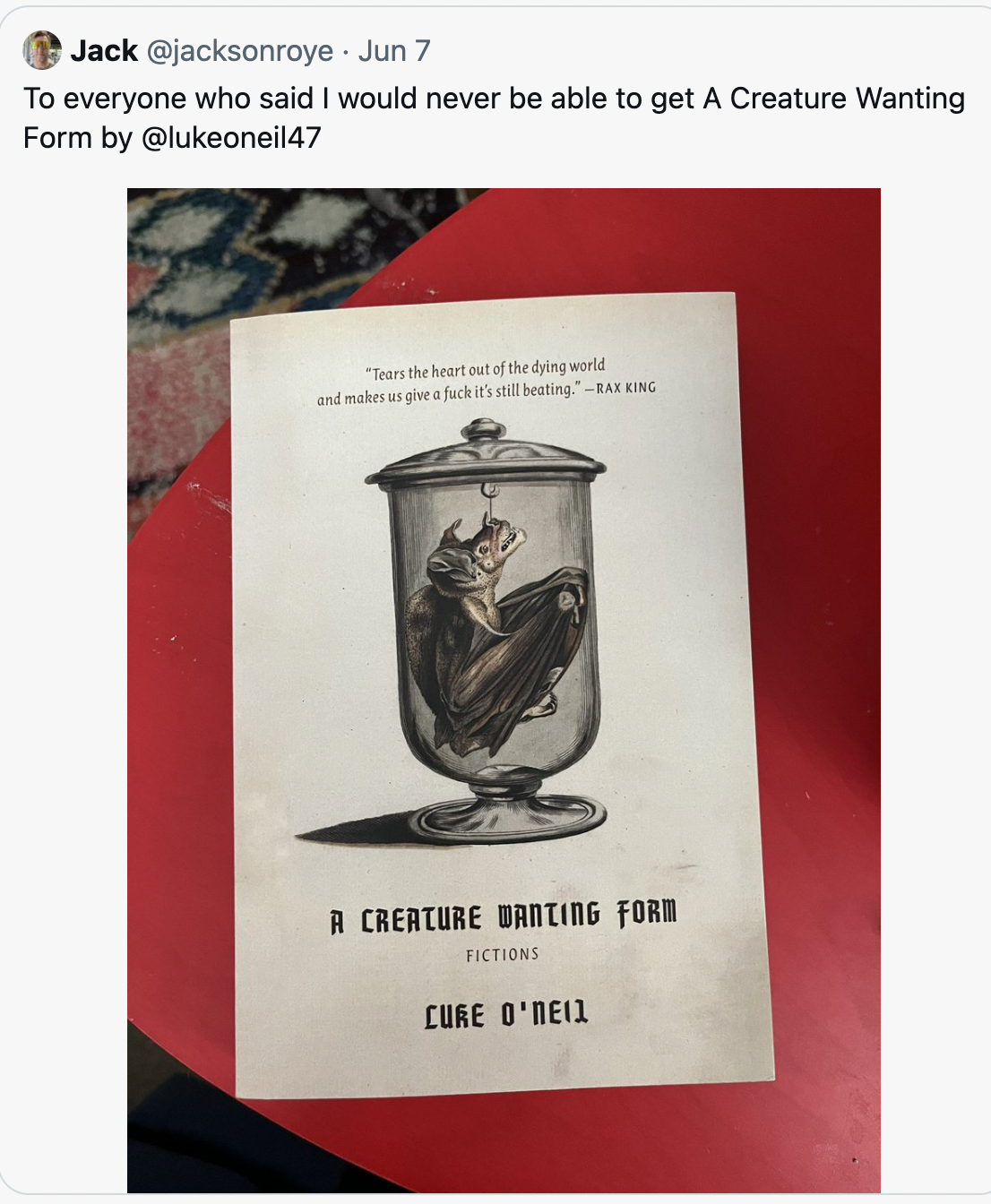
The nurse said it was nice to see me again. She was very excited that I hadn't had to come back in for almost a year and I said I'd prefer not to ever see you again. No offense but you understand right and she said she understood.
They treat you like a child at the hospital I go too now for my spinal steroid injections. Not like a child I guess more like a very old person which is sort of the same thing in terms of how it all begins and ends. How it all averages out to helplessness in the long run. Even though the walk from the waiting room to the surgery room was like two minutes long they insisted on pushing me there in a wheelchair. At one point I asked if I could take off my shoes before we get in there and they all reacted like I asked if I could take a shit on the floor. I guess they're worried you might slip in your socks and then it's their ass.
We gotta get this guy back up and out there running the doctor said when I rolled in and all the nurses and the x-ray guy and everyone said haha and I said well maybe not in this smoke and they said haha. Is it bad out there someone asked and I said yeah but have you seen how bad it is in New York right now and they said they hadn't. Too busy doing surgeries and such to be on their phone all day I gather. I said well maybe it's not all bad it might actually improve the smell of the city and they said haha.
I feel bad now about saying that type of thing I'm sorry to New York City it's just that you want the people who are about to stick a needle into your spine to like you and you'll pretty much say anything to win their favor.
All things considered these steroid injections into your spine don't take very long but then again all things considered it's still a very large needle puncturing through the thick skin and muscles of your lower back and... well... needling I guess you could say its way into the spaces between your vertebrae and shooting out medicine onto a raw nerve. I usually deal with it fine more or less but this time he was right up on the thing and it was like pressing a button that recreates the most severe expression of pain you've ever felt which in my case is a kind of catastrophic combination of numbness and fire and pressure down my leg. I made a noise I wasn't really proud of and my entire left leg felt like it was going to erupt. Imagine if you put a big firecracker inside of a watermelon or something and were waiting for the fruit goo to explode everywhere. I sincerely thought for a minute that was going to be my leg. Like a cheap special effect in an exploitation film.
That didn't happen though. Instead I just had to lay there and grip the little foam thing at the head of the operating table until my hands were sweaty. The nurse was massaging my shoulders up and down in what I thought was kind of a too familiar way and trying to make small talk with me and even then amidst the suffering I thought I wonder if she thinks my arms feel jacked?
Then it was over and before long they had me back in another wheelchair to wait and see if anything weird was going to happen and when it didn't it was another wheelchair for the ride out of the hospital. I swear to god the woman pushing me was like eighty five years old and maybe five feet tall and I thought well this is extra emasculating and I said to her haha getting a good work out back there and she said I already worked out today. She was obliterating my ass in several ways.
Next thing I was being helped into the car where M. was waiting for me and I went home and I was never in pain again. I lived the rest of my life free of that burden and it was beautiful. And the air was clean too. The air was always going to be clean.
Alright here's Vince now writing about the Cheeto movie.
Subscribe if you can to help pay for our great contributors.
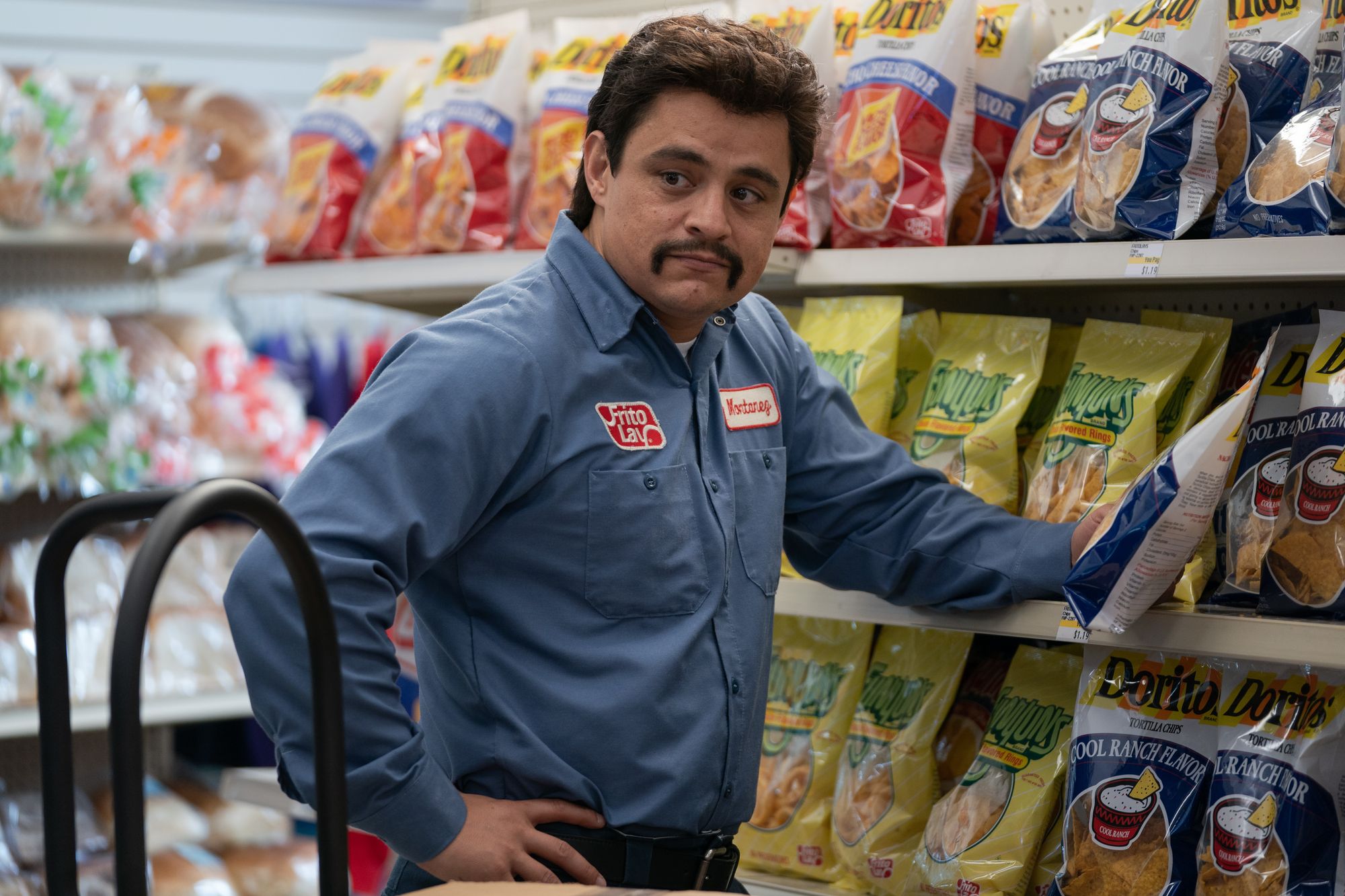
The Perfect American Success Story
Flamin’ Hot, a rags-to-riches tale of corporate success opening this week in theaters and on Hulu, purports to be a story about all those qualities we’re told that capitalism rewards – hard work, big ideas, and being a loyal, enthusiastic employee. If that sounds a bit like a fairytale, that might be because the guy who wrote the memoir upon which it’s based seems to have made it all up. Or at the very least, wildly padded his resume for dramatic effect.
The irony is that his real journey is inspirational in its own way, and could’ve been much more honest about what capitalism actually rewards – corporate realpolitik, the confidence to tell a good lie well, and the power of seductive bullshit people will pretend to believe if it flatters us.
Directed by Eva Longoria in her feature directorial debut, Flamin’ Hot stars Jesse Garcia as Richard Montañez, a vato from East LA who never finished grade school, who becomes a janitor at the Frito-Lay plant in Rancho Cucamonga before successfully pitching the CEO on the One Big Idea that will save the factory and make Richard’s dreams come true: the Flamin’ Hot line of Frito-Lay products. Light hearted and enticingly breezy, with a charming performance by Garcia, Flamin’ Hot plays like an unholy amalgam of Undercover Boss, identity marketing, and megachurch testimonials (co-produced by a titan of faith-based films, DeVon Franklin, also of Heaven Is For Real). Montañez’s “lightbulb” moment comes when he sees a video address from CEO Roger Enrico (Tony Shalhoub) urging his employees to “think like CEOs.”
Montañez, a loyal janitor for 10 years, and the only employee who cared to pay attention to his CEO’s video address, as the movie tells it, ends up being the only one with the big idea, wouldn’t you know. Unlike the movie version, the real-life Montañez actually did think like a CEO. He figured out how to co-opt a big success that already existed and tell a good story without letting the facts or the real creators get in his way.
Flamin’ Hot is clearly of a piece with the latest trend in biopics like Air and Tetris, in which the businessmen are the real heroes. You’d be hard pressed to find a more benevolent depiction of the fairytale dad-boss than Roger Enrico in Flamin’ Hot, who functions as Montañez’s corporate benefactor and surrogate father. Montañez reportedly mentions Enrico 60 times in his memoir. There’s just one problem: according to a bombshell LA Times report in 2021, Enrico didn’t become CEO until after Flamin’ Hots had already been out in a test market for six months.
According to that report, the Flamin’ Hot product line didn’t come from Montañez at all, but from a junior exec fresh out of an MBA program named Lynne Greenfield. As a colleague of Greenfield’s is quoted in the piece, “We’d go on a field marketing tour and bring home 50 different bags of chips that we had never seen in our lives — they’d say we’re losing sales to this kind of product line right now. And so Flamin’ Hot was actually, you could call it a flavor idea.”
Which is to say, the creation of Flamin’ Hot back in the early 1990s was the result of a big company copycatting ideas from smaller ones in order to snuff out competition; basically the opposite of the “best idea wins” world depicted in the glorious meritocracy of the Flamin’ Hot movie universe. The fantasy that they were instead the result of innovation, of one Chicano dreamer’s big idea inspired by his benevolent CEO, who then rewarded him with an executive position, is obviously much more flattering to business executives and more in line with our American platitudes about immigrants and their children pulling themselves up by the bootstraps. It’s not hard to imagine why most people at Frito-Lay were in no rush to poke holes in Montañez’s story.
Montañez had been telling that story since the late aughts, of being a middle school dropout (the LA Times pointed out that he appeared in his freshman class yearbook, which seems like a minor nitpick) who, through faith in himself, faith in God, and love of his community, invented the Flamin’ Hot Cheeto. He told this story so well and so often that he became a sought-after motivational speaker, appearing “at events for Target, Walmart, Harvard and USC, among others, and commanding fees of $10,000 to $50,000 per appearance.”
His subsequent memoir, Flamin’ Hot: The Incredible True Story of One Man’s Rise from Janitor to Top Executive, (actually his second memoir, his first, A Boy, A Burrito, And A Cookie came out in 2013) sparked a bidding war with the movie rights baked in, won in part by DeVon Franklin and Searchlight Pictures. Now the book and movie are being released within a week of each other.
Greenfield, who actually came up with Flamin’ Hot, reportedly didn’t hear that Montañez had been taking credit for the product until she saw an Esquire blog about it until 2018. She started asking some questions about Montañez, sparking an internal investigation at Frito-Lay that may or may not have spurred Montañez, along with a corporate mentor who had backed his story all along, to retire within the span of a few months in 2019. There does seem to be some justification for Montañez’s self-mythologizing, in that he did actually rise from the factory floor to become a successful marketing executive, in the span of 10 or 15 years, and was heavily involved with the launch of the Sabrositas line and some creative efforts to market it. (It seems he may have just swapped out Sabrositas for the more famous Flamin Hots to make his story sound cooler.)
But, as they say, the cover-up is worse than the crime, and whenever he’s been called out on it, Montañez has mostly doubled down.
After the investigation and his retirement, Montañez has also repeatedly posted to his social media accounts photographs of what he claims are original design materials for Flamin’ Hot Cheetos. Many have recently been deleted.
One photograph, posted to Instagram in October 2019 but now deleted, shows four pieces of lined notebook paper, labeled “mild,” “reg,” “hot” and “extra hot,” with Cheetos piled on top of each. At the bottom of one, Montañez signed his name and wrote the date “1988.”
In another post, now deleted, he wrote that he worked on the Doritos Salsa Rio flavor in 1998 — a product that first hit test markets in 1987, according to Advertising Age articles from that year.
In an official statement to the LA Times at the time of their publication, Frito-Lay commented “We have interviewed multiple personnel who were involved in the test market, and all of them indicate that Richard was not involved in any capacity in the test market. That doesn’t mean we don’t celebrate Richard, but the facts do not support the urban legend.”
Again, clearly they’re not too worried about Montañez taking credit. Other figures from the company have gone even further:
Indra Nooyi, who was chairman and CEO of PepsiCo [from 2006-2018], has blurbed Montañez’s new memoir, calling it a “tour de force.” (Nooyi also retired in 2019.) Tom Greco, who took over at Frito-Lay once Carey moved to Pepsi, has also blurbed the book. Nooyi joined PepsiCo in 1994, and Greco worked in Frito-Lay’s Canadian division until the early 2000s.]
Roger Enrico, the PepsiCo CEO played by Shalhoub, died in a snorkeling accident in the Cayman Islands in 2016, but Montañez has occasionally flirted with crediting the “think like a CEO” video that inspired him to a different Frito-Lay exec, Al Carey, who’s now on the board of Home Depot and appears with Montañez at events. (Flattering the right people seems to be part of the real Montañez’s genius).
The movie was already well into production by the time the LA Times published their exposé in 2021, leaving Eva Longoria, arguably unfairly so, to become the point person for reporters’ questions about the murky business of building a biopic around a lie. Where she might have offered insight, or even changed tack, she too dug in. She told the LA Times in a later interview, “That story never affected us. Feels like L.A. Times would have better resources dedicated to more important things. We never set out to tell the history of the Cheeto. We are telling Richard Montañez’s story and we’re telling his truth.”
Longoria’s response is perfectly in line with the movie, using new-agey jargon about representation and “living your truth” to disguise otherwise mostly old school paeans to religious faith and the American Dream – self-actualization and megachurch Christianity bent towards capitalism until they’re virtually indistinguishable from one another.
The movie version of Montañez receives counsel from his born-again father (played by Emilio Rivera from Mayans MC, who’s always great to see) and eventually exhorts a room full of Frito-Lay executives that his proposed Flamin’ Hot product would inspire his fellow Latinos to buy it because “the taste would feel like home.”
Okay, so work hard, get on your grind, believe in yourself (and maybe also God) and get that bag: What’s so wrong with telling people that?
Nothing, I suppose, and Montañez’s job these days, after all, is being a motivator. It’s just that Montañez, and the entire movie apparatus that dedicated itself to taking his memoir at face value, cuts so many corners to give us the “nice” version of his story that it actually qualifies as bad advice. He’s telling us that he’s Atticus Finch when he’s maybe more like Frank Abagnale. Not only does the Frank Abagnale version have the benefit of being more true, it’d probably be a better movie. Montañez, the real one, is old school in a lot of ways, a classic case of disguising his money-making scheme as money-making advice, the same basic format as pyramid schemes and crypto scams.
Flamin’ Hot tells us to stay loyal to the brand and trust in your CEO and success will come. Examples of why that’s actually bad business advice abound, but if I could choose just one, how about this week’s news of the PGA Tour-LIV golf merger? When a Saudi-backed golf league formed in 2022 and started handing out massive, eight-figure contracts to prominent golfers, the PGA essentially deputized the players who stayed loyal to run a smear campaign–about why LIV was sportswashing, how it was bad for golf, the players who left were greedy traitors, and on and on. Fast-forward to this week, when the PGA’s commissioner Jay Monahan held a surprise press conference announcing a merger with LIV, blindsiding his most loyal acolytes and basically making them look like fools, and letting the players who actually defied him and took the money have their proverbial cake and eat it too. That’s what taking a CEO at face value and being a “good soldier” actually gets you in the corporate world these days.
Montañez, to his credit, was smart enough not to practice what he’s been preaching. “Success has many fathers,” so the saying goes, and Richard Montañez was clever enough to realize that sometimes an adopted father is just as good. I’d love to see an honest movie about that guy.
Vince Mancini writes at vincemancini.substack.com. He hosts a comedy podcast about movies called the Frotcast and a Wire rewatch podcast, Pod Yourself The Wire. He is the founder of Filmdrunk and the former Senior Film & Culture Writer at Uproxx, with current bylines at GQ.
That's all for today buddy. See you next time. Here's a good song for the road.
